Samuel Beckett (1906–1989)
Sam Slote
Samuel Barclay Beckett, one of the most influential writers of the twentieth century, was born in Foxrock, an affluent Dublin suburb, on 13 April (Good Friday) 1906. His family was of Protestant Huguenot stock and he enjoyed a comfortable childhood. He first attended the Earlsfort House School in Dublin, where he learned French to a high degree of proficiency (the school was bilingual). From 1920–1923 he followed his older brother Frank to the Portora Royal School in Enniskillen. He then went to Trinity College Dublin from 1923–1927, where he studied modern languages and, despite much stress, passed the Foundation Scholarship examination in 1926. His final results upon graduation earned him the Gold Medal. His tutor was the renowned Berkeley scholar A. A. Luce. In addition to his academic accomplishments, Beckett played on various College sports teams and had two first-class cricket matches against Northamptonshire in 1925 and 1926, making him the only Nobelist to merit an entry in Wisden Cricketers’ Almanack.
From his first year at Trinity he caught the attention of Thomas Rudmose-Brown, Professor of Romance Languages. Rudmose-Brown specialised in French literature and was unusual for combining the traditional canon with more modern and experimental works. The depth, range, and eclecticism of Rudmose-Brown was to have a lasting impact upon Beckett. In 1983 Beckett admitted that ‘Much needed light came to me from “Ruddy”, from his teaching and friendship. I think of him often and always with affection and gratitude’ (quoted in Knowlson 1996, 48). As a student, Beckett also read widely in Italian literature – especially Dante – and English literature. ‘The Trinity years were crucial to SB, the smithy in which his soul was forged’ (Ackerley and Gontarski 2004, 589).
In March 1927, at Rudmose-Brown’s recommendation, Beckett was nominated for a position as Trinity College’s exchange lecturer with the École Normale Supérieure in Paris upon his graduation; although his appointment was delayed a year due to a misunderstanding concerning the tenure of his predecessor, Thomas McGreevy. Beckett stayed in Paris for two years, from October 1928 until September 1930. Through McGreevy Beckett enjoyed his first entrée into the Parisian literary scene and met James Joyce. Beckett began a close friendship with McGreevy and their correspondence throughout the years affords a key perspective on Beckett’s maturation. In Paris, Beckett continued his friendship with Alfred Péron, a graduate of the École Normale Supérieure, who he had met previously at Trinity when the Frenchman had held the reciprocal position of lecteur. Beckett’s two years in Paris saw his first publications: an essay on Joyce’s Finnegans Wake (then being serialised as ‘Work in Progress’), a short story entitled ‘Assumption’, and some poems, including the separately published and award-winning ‘Whoroscope’, which proffers a parodic life of René Descartes and is based on J. P. Mahaffy’s biography of the same. A monograph on Proust, strongly influenced by Schopenhauer, was written quickly in the summer of 1930 and published the following year.
Upon his return to Dublin, Beckett accepted a three year appointment as a Lecturer in French at Trinity, where he lived in House 40 (for his final undergraduate year, he had lived in House 39). His playful erudition found an outlet in a witty and well-received lecture, concerning a non-existent French poet he dubbed Jean de Chas, given to the Trinity Modern Languages Society. He also participated in a pastiche of Corneille’s Le Cid and Chaplin’s The Kid entitled ‘Le Kid’; this was written by Beckett’s Parisian friend Georges Pelorson, who had also taken up a post at Trinity. The play was performed at the Peacock Theatre by the Trinity Modern Languages Society. During this period Beckett visited Paris several times and collaborated with Péron on translating the ‘Anna Livia Plurabelle’ chapter from Finnegans Wake into French.
However, Beckett soon became despondent and began to realise that he was not suited to lecturing. His correspondence with McGreevy reveals the depths of Beckett’s despair at Trinity: he became disenchanted with the whole ethos of professional academic life, which he called in his 1934 poem ‘Gnome’, ‘the loutishness of learning’ (first published in the Dublin Magazine 9.3). Indeed, Beckett’s early prose is littered with many expressions of his animosity towards the pretentions of academia. After months of vacillation, Beckett submitted his resignation to College whilst on holiday in Kassel in December 1931. Beckett’s friend (and romantic rival) A. J. ‘Con’ Leventhal assumed Beckett’s position in the wake of his abrupt resignation.
Beckett stayed in Kassel for about a month before returning to Paris, where he wrote poems and tried, unsuccessfully, to get his novel Dream of Fair to Middling Women published. One of the characters in this novel, the Polar Bear, was a vicious parody of Rudmose-Brown. Beckett had begun writing this novel whilst still at Trinity; only two short excerpts were published in his lifetime. He returned to Dublin, after a short stay in London, in August 1932 where he continued his writing. Beckett was left distraught by the death of his father in June 1933. By the end of the year, he moved to London, where he remained, on and off, for two years. A collection of short stories, More Pricks than Kicks, was published in London in 1934; some of the stories were written whilst Beckett was still affiliated with Trinity. A tailpiece story, ‘Echo’s Bones’, was written at the publisher’s request to round out the volume, but this was then refused once the story had been written. Beckett then decided against any publication during his lifetime, although he recycled the title for a collection of poems published in 1935.
Beckett continued to visit Dublin during his years in London and during one such trip in early 1936 he spent some time in Trinity’s Old Library to read the works of the Flemish philosopher Arnoldus Geulincx, whose book Ethica provided a lifelong fascination. In London, Beckett undertook a period of psychoanalysis under the supervision of Wilfred Bion. He also began work on his first major literary work, the novel Murphy, written between 1935 and 1936 and published in 1938. Joyce was so impressed by Murphy that he memorised parts of the novel and he confided to his son Giorgio that ‘I think he [Beckett] has talent’ (Ellmann 1982, 701).
In September 1936 Beckett travelled to Germany for an extended stay to write and visit art galleries. He was disappointed to find the country transformed under the Nazis. His diaries from this trip contain extensive records of both his intellectual evolution as well as the cultural, political, and economic circumstances throughout Germany at this time. After some months back in Dublin, Beckett moved to Paris at the end of 1937, which was now to become a more permanent home. Almost immediately after moving to Paris, Beckett was accosted at random and stabbed, almost fatally, by a pimp named M. Prudent. This story was reported on in the Dublin Evening Herald with the ominous headline, ‘Irishman stabbed in Paris’ (Knowlson 1996, 282). Beckett’s injury led to the rekindling of his friendship with Joyce, who arranged for a private room in a hospital during his convalescence.
In Paris, Beckett’s literary career, slowly, began to progress. He decided to switch to French for writing poetry. He also began a relationship with Suzanne Deschevaux-Dumesnil, whom he eventually married in 1961. When war broke out in 1939, Beckett was in Dublin visiting his mother and with some difficulty managed to return to Suzanne in Paris. In 1940 Péron enlisted Beckett and Suzanne into a Resistance cell code-named ‘Gloria SMH’, which was affiliated with the British Special Operations Executive. Beckett later characterised his work for the Resistance as ‘boy scout stuff’ and while his work was simple, collating and typing information, it was also quite dangerous (he was awarded both the Croix de Guerre and the Médaille de la Reconnaissance after the War). Eventually, the cell was compromised and Péron was arrested (he died shortly after liberation). Barely one step ahead of the Gestapo, Suzanne and Beckett managed to flee Paris to settle in Roussillon in the unoccupied south, where they stayed for the remainder of the War. In Roussillon, wavering between boredom and terror, Beckett managed to finish Watt, his last novel written in English. ‘Though there is no trace of the global conflict in Watt, it reads very much as if it could only have emerged from a world gone mad’ (Pilling 1994, 36).
Beckett managed to return to Dublin after the War to visit his mother. Upon his return to France he worked as an orderly for the Irish Red Cross at a hospital in Saint-Lô, a small town in Normandy that had been devastated during the D-Day invasions. Once the War and its immediate aftermath were over, Beckett and Suzanne returned to Paris where Beckett would soon begin a very productive period, which he later dubbed ‘a frenzy of writing’.
In the years 1946–1953 Beckett wrote four short stories, four novels, three plays, along with various poems and shorter prose pieces including some art criticism. During this frenzy of writing, he also switched to French as the primary language of composition. The reasons he gave for this change are varied, with perhaps the most direct explanation being his comment to his friend Israel Shenker, ‘It was a different experience from writing in English. It was more exciting for me—writing in French’ (quoted in Knowlson 1996, 357).
Beckett made the transition to French twenty-nine pages into the draft of a short story initially entitled ‘Suite’ (subsequently changed to ‘La Fin’ for the French and then ‘The End’ for the later full English version). He then wrote the novel Mercier et Camier (which was not published until 1970) and then three short stories, all in French. In early 1947 Beckett wrote a play in French, Eleutheria, although this was only published posthumously (and not without some controversy). The period from May 1947 through January 1950 saw a high degree of productivity with a series of three novels Molloy, Malone meurt, and L’Innommable. In-between the last two of these novels, Beckett wrote another play, En attendant Godot.
Thanks to Suzanne’s efforts, Molloy and Malone meurt found a publisher in Jérôme Lindon’s Éditions de Minuit and these first appeared in 1951, with Godot following in 1952 and L’Innommable in 1953. Godot was first performed on 5 January 1953 at the Théâtre Babylone and while the initial reactions were first mixed, word quickly spread and its audience grew. It ran for 400 performances and made Beckett a celebrity both in France and internationally. Its success led to Beckett translating the play into English. There is some irony to the first American production of Godot, which, bizarrely, was staged in Miami in 1956. Billed as ‘the laugh hit of two continents’, it did not enjoy much success with its audiences of sun-seeking vacationers. Later productions in New York and London were somewhat more successful, as were the first Dublin productions, first at the Pike Theatre and then at the Gate. One of the earliest well-received American productions was at San Quentin prison in 1957, performed by the prisoners’ drama workshop.
Beckett’s self-translation of Godot set up a pattern where he would translate his French-first works into English, although the expression ‘rewrite into English’ would be more accurate since the English version of Godot differs, and in some places considerably, from the French (indeed, Beckett later revised the French version in light of some of the divergences from the English). Beckett also reworked his three novels into English, Molloy with the collaboration of the South African writer Patrick Bowles and Malone and L’Innommable on his own. Bowles remarked that rather than simply translate, their aim was ‘to write a new book in a second language’ (1994, 33).
The ending of L’Innommable as first published read ‘il faut continuer, je vais continuer’; for the English version Beckett added in a new clause, ‘you must go on, I can’t go on, I’ll go on’ (emphasis added; the French was emended accordingly for the 1971 printing). Such a statement of aporia is not inappropriate: L’Innommable marked the end of Beckett’s so-called ‘frenzy of writing’ and so he found himself needing new and different ways to express aporia. His next attempts at prose – the Textes pour rien – were all stunted and failed attempts at continuation.
In 1955 he returned to writing in English with the short prose piece eventually given the arch title ‘From an Abandoned Work’. He gifted the Trinity News with its first publication (in the issue of 7 June 1956), although he was less than happy with their editorial mangling. In 1956 he wrote the play Fin de partie (translated as Endgame). Later that year he wrote a radio play in English, All That Fall. This set up a pattern that Beckett would follow for the rest of his life where most (but not quite all) the prose was written in French first and most (but not quite all) the drama in English first. Neither English nor French, Beckett was a bilingual writer (according to Seamus Heaney, when asked by a French journalist if he was English, Beckett replied ‘Au contraire’; Heaney stated that this was a definition of Irishness he quite admired [1982, 407]).
Although Beckett continued to struggle with varying manifestations of writer’s block, he managed to produce over the years a considerable output in different languages and across numerous genres. S. E. Gontarski characterises Beckett’s later works as ‘generically androgynous’ (1995, xxx), expressions of impasse expressed, imperfectly, through and between poetry, prose, drama, radio drama, televised drama and even one film, helpfully entitled Film (1964) and which stars Buster Keaton. Film takes as its epigraph Berkeley’s dictum ‘esse est percipi’ (to be is to be perceived), thereby showing the enduring influence of Beckett’s former Trinity tutor Luce. Indeed, even though Beckett rebelled against the academic life as institutionalised and formalised through the pomp and Fellows of Trinity, his entire career as a writer projects from—in varying vectors—the intellectual climate he absorbed both as a student and lecturer. The drafts of Beckett’s final prose text, ‘Stirrings Still’, contain a fascinating pattern of revisions inspired by a line from the Inferno that Beckett first recorded as a Trinity student in his Dante notebook (see Van Hulle 2011, 92–96).
In 1959 H. O. (‘Ho’) White, Emeritus Professor at Trinity, wrote to Beckett on behalf of College to ask if he would accept the honorary degree of Doctor of Letters. Through Leventhal, Ho White had become friendly with Beckett and over the years kept him apprised of his works’ reception in London and Dublin. After some deliberation, Beckett decided to accept the degree because, as his biographer James Knowlson speculates, ‘he probably regarded it as a gesture of forgiveness for having walked out of his lectureship over twenty-five years before’ (1996, 465). The degree was conferred on 2 July 1959.
One of the few other such awards Beckett accepted was the Nobel prize, in 1969. Suzanne’s initial reaction was to call it a catastrophe, but he decided to accept the award, although not in person, out of deference to his publishers who had stood by him before the success of Godot. He donated much of the prize money to Trinity’s library.
Indeed, over the years Beckett was quite generous to his alma mater. In 1969 he donated four notebooks to the Library, and this collection has subsequently been augmented through purchase. Among the many highlights are the notebook that contains the drafts that became ‘Imagination Dead Imagine’ (TCD MS 11223), the ‘Kilcool manuscript’ (TCD MS 4664), an unpublished fragment of a dramatic monologue from 1963 that is a precursor to both the plays Not I and That Time, and two drafts of Beckett’s final play, the unpublished and unperformed Endhörspiel, a brief dialogue between Silence and Voice (the manuscript of this play was included in a letter to Barbara Bray dated 7 March 1988; TCD MS 10948/1/701). Beckett’s manuscripts and notes are especially important since much of his work as a writer involves the slippages and lapses and inabilities of writing and so, unsurprisingly, beyond his published canon exists a kind of fragmentary ghost canon. He is, to quote Peter Fifield, ‘an archivist’s author’ (2011, 673; see also Nixon 2014).
In addition to these manuscripts, Trinity is a major repository for Beckett’s correspondence, and holds the letters to McGreevy and the letters to Barbara Bray, as well as those to Bettina Jonic, the Pike theatre, Patrick Magee, Arland Ussher, Nick Rawson, and Peggy Beckett. The Library also has collections of signed first editions, international critical literature and Beckett-in-translation; specifically the personal libraries of Con Leventhal and S. E. Gontarski. The Manuscripts & Archives Research Library at Trinity mounted a large exhibition of their Beckett holdings to mark the centenary of his birth in 2006 and is a key participant in the on-going Samuel Beckett Digital Manuscript Project. In his honour the main theatre belonging to College was named the Samuel Beckett Theatre in 1992. And since 2011 College hosts the annual Samuel Beckett Summer School, which is jointly run by the School of English and the School of Drama, Film, and Music.
Cite as: ‘Samuel Beckett’ by Sam Slote at https://www.tcd.ie/trinitywriters. First
published January 2016
Works Cited
- Ackerley, C. J. and Gontarski S. E., The Faber Companion to Samuel Beckett. London: Faber, 2006.
- Patrick Bowles, ‘How to Fail: Notes on Talks with Samuel Beckett’. PN Review 96 20.4 (1994): 24–38.
- Cohn, Ruby. A Beckett Canon. Ann Arbor: The University of Michigan Press, 2001.
- Ellmann, Richard. James Joyce, rev. ed. Oxford: Oxford University Press, 1982.
- Fifield, Peter. ‘Samuel Beckett: Out of the Archive: An Introduction’. Modernism/Modernity 18.4 (Nov. 2011): 673–79.
- Gontarski, S. E. ‘Introduction’. In Samuel Beckett: The Complete Short Prose 1929–1989, ed. S. E. Gontarski. New York: Grove, 1995. xi–xxxii.
- Heaney, Seamus. Interview with Frank Kinahon. Critical Inquiry 8.3 (Spring 1982): 405–14.
- Knowlson, James. Damned to Fame: The Life of Samuel Beckett. London: Bloomsbury, 1996.
- Le Juez, Brigitte. Beckett before Beckett. London: Souvenir Press, 2008.
- Nixon, Mark. ‘Beckett’s Unpublished Canon’. In The Edinburgh Companion to Samuel Beckett and the Arts, ed. S. E. Gontarski. Edinburgh: Edinburgh University Press, 2014. 282–305.
- O’Brien, Eoin. The Beckett Country. Dublin: The Black Cat Press, 1986.
- Pilling, John. ‘Beckett’s English Fiction’. In The Cambridge Companion to Samuel Beckett, ed. John Pilling. Cambridge: Cambridge University Press, 1994. 17–42.
- Uhlmann, Anthony (ed.). Samuel Beckett in Context. Cambridge: Cambridge University Press, 2013.
- Van Hulle, Dirk. The Making of Samuel Beckett’s ‘Stirrings Still’/‘Soubresauts’ and ‘Comment dire’/‘what is the word’. Antwerp: University Press Antwerp, 2011.
Links:
- Beckett holdings at Trinity: http://marloc.library.tcd.ie/CalmView/Overview.aspx?s=Samuel%20Beckett
- Samuel Beckett Theatre: https://www.tcd.ie/beckett-theatre/
- Samuel Beckett Summer School: http://beckettsummerschool.wordpress.com
- Beckett International Foundation: http://www.beckettfoundation.org.uk
- Beckett Digital Manuscript Project: http://www.beckettarchive.org
- The Beckett Circle: http://www.beckettcircle.org
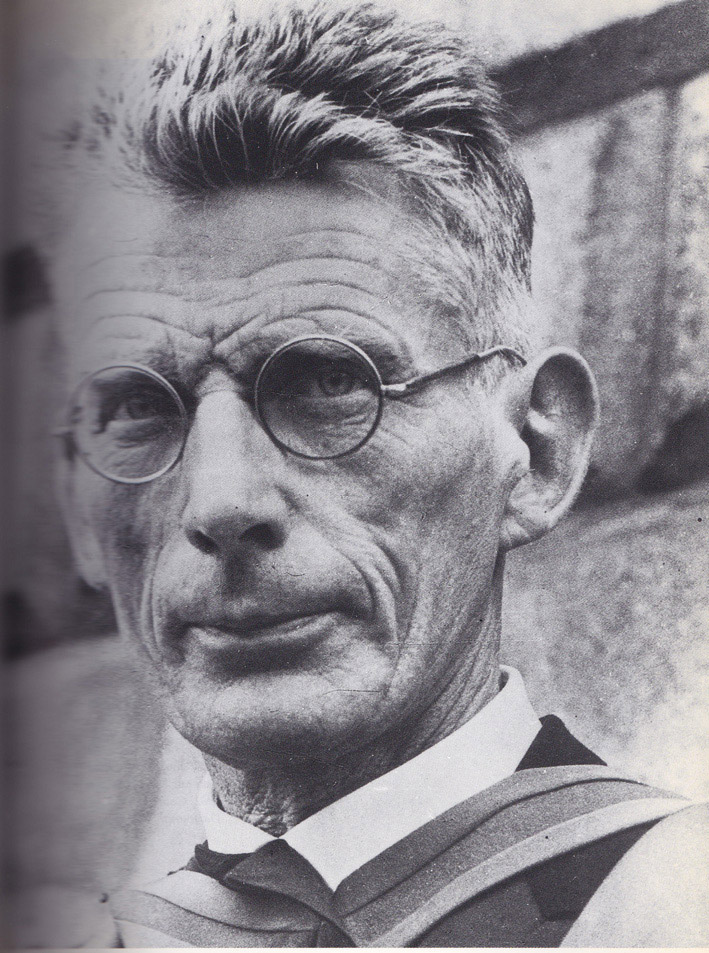 Samuel Beckett in academic robes on the occasion of the conferral of the honorary degree of Doctor of Letters, Trinity College Dublin, 2 July 1959.
Samuel Beckett in academic robes on the occasion of the conferral of the honorary degree of Doctor of Letters, Trinity College Dublin, 2 July 1959.
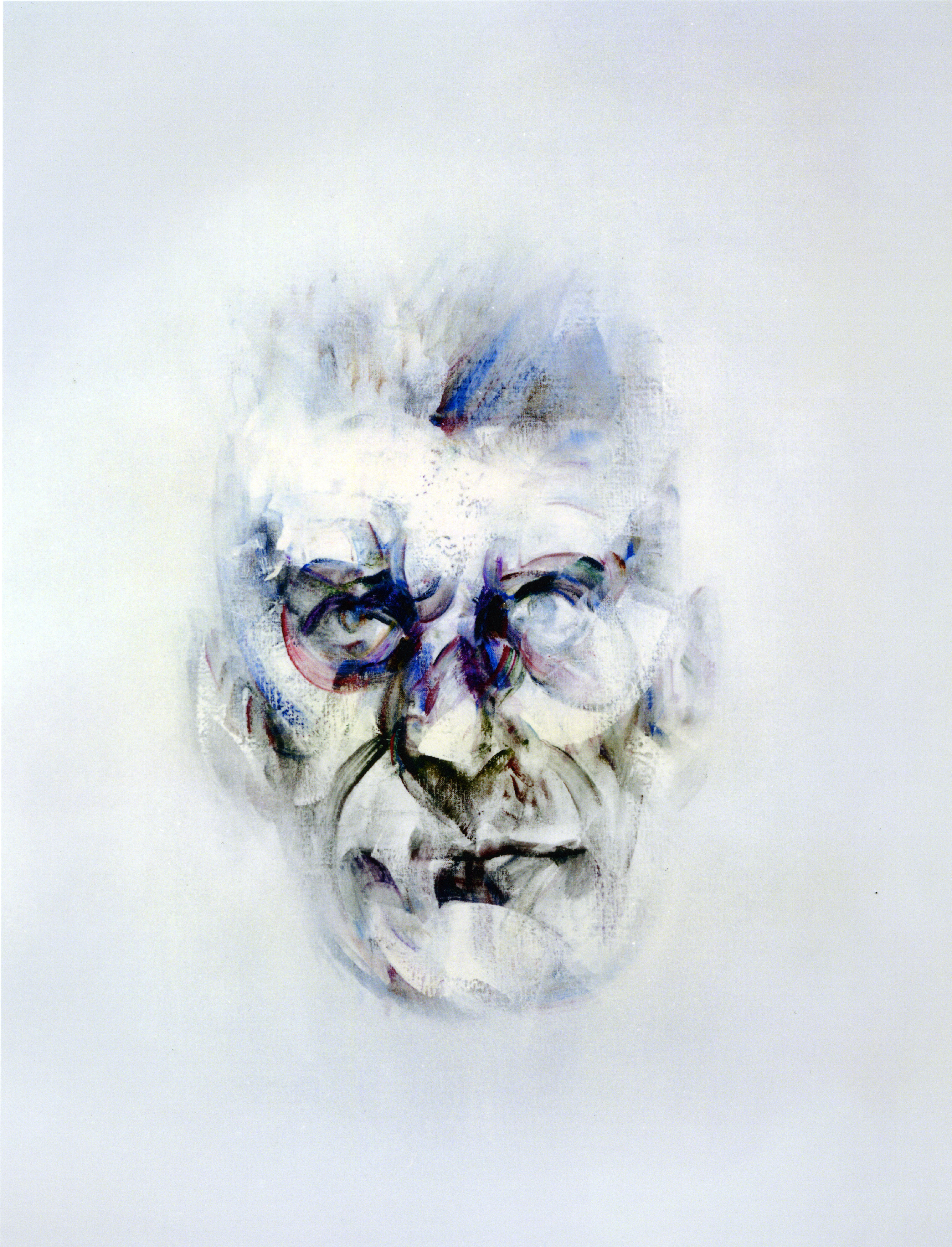 Louis le Brocquy, Study towards an Image of Samuel Beckett, 1977, oil on canvas, 80 x 80 cm, Trinity College Dublin Art Collections. Reproduced by kind permission from The Board of Trinity College Dublin, The University of Dublin ©the artist’s estate
Louis le Brocquy, Study towards an Image of Samuel Beckett, 1977, oil on canvas, 80 x 80 cm, Trinity College Dublin Art Collections. Reproduced by kind permission from The Board of Trinity College Dublin, The University of Dublin ©the artist’s estate
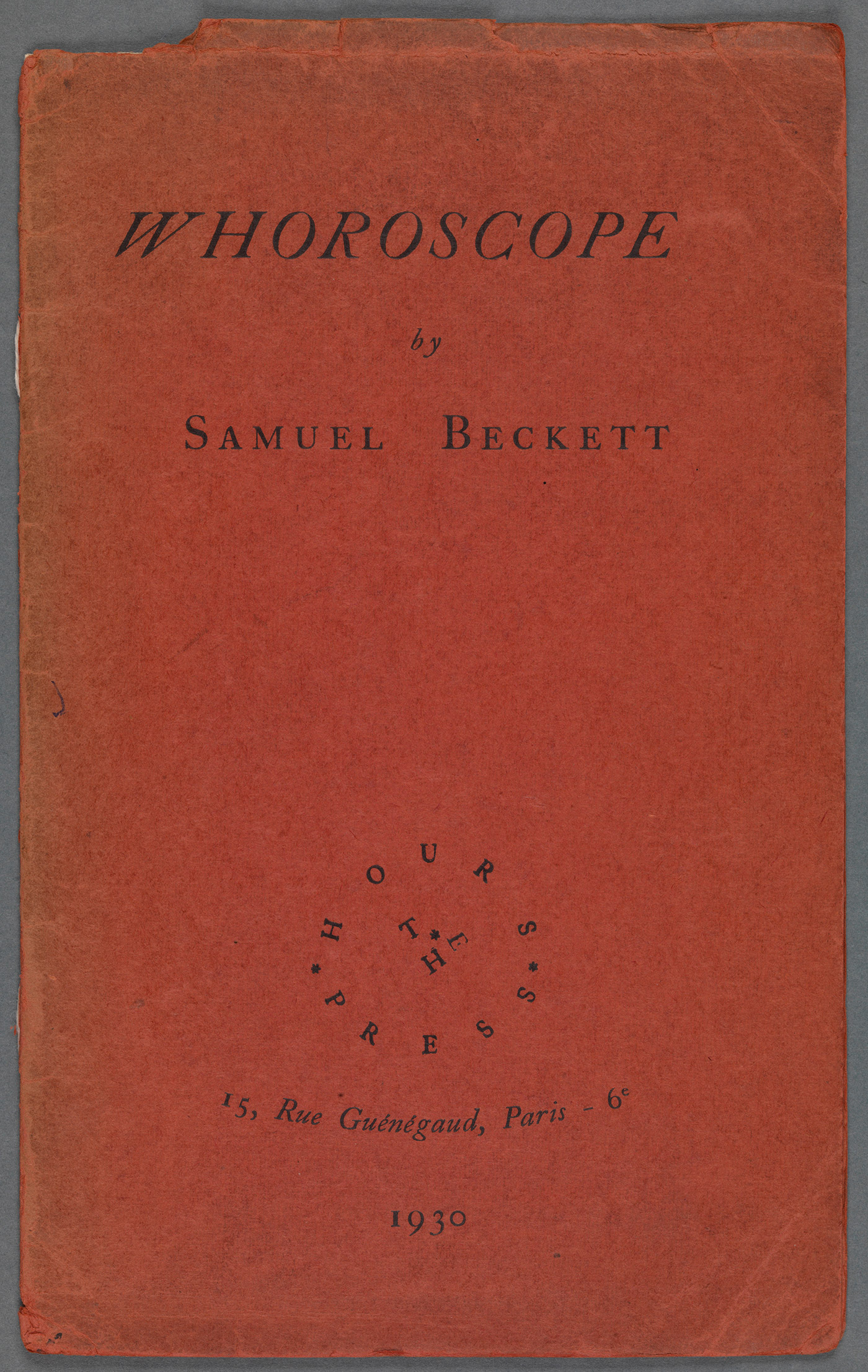 Samuel Beckett, Whoroscope (Paris: The Hours Press, 1930), (TCD OLS.JOH.14.No.8) by permission of the Board of Trinity College Dublin, The University of Dublin
Samuel Beckett, Whoroscope (Paris: The Hours Press, 1930), (TCD OLS.JOH.14.No.8) by permission of the Board of Trinity College Dublin, The University of Dublin
The copy of Whoroscope reproduced here is no. 263 of a run of 300 copies. It belonged to the library of the playwright Denis Johnston
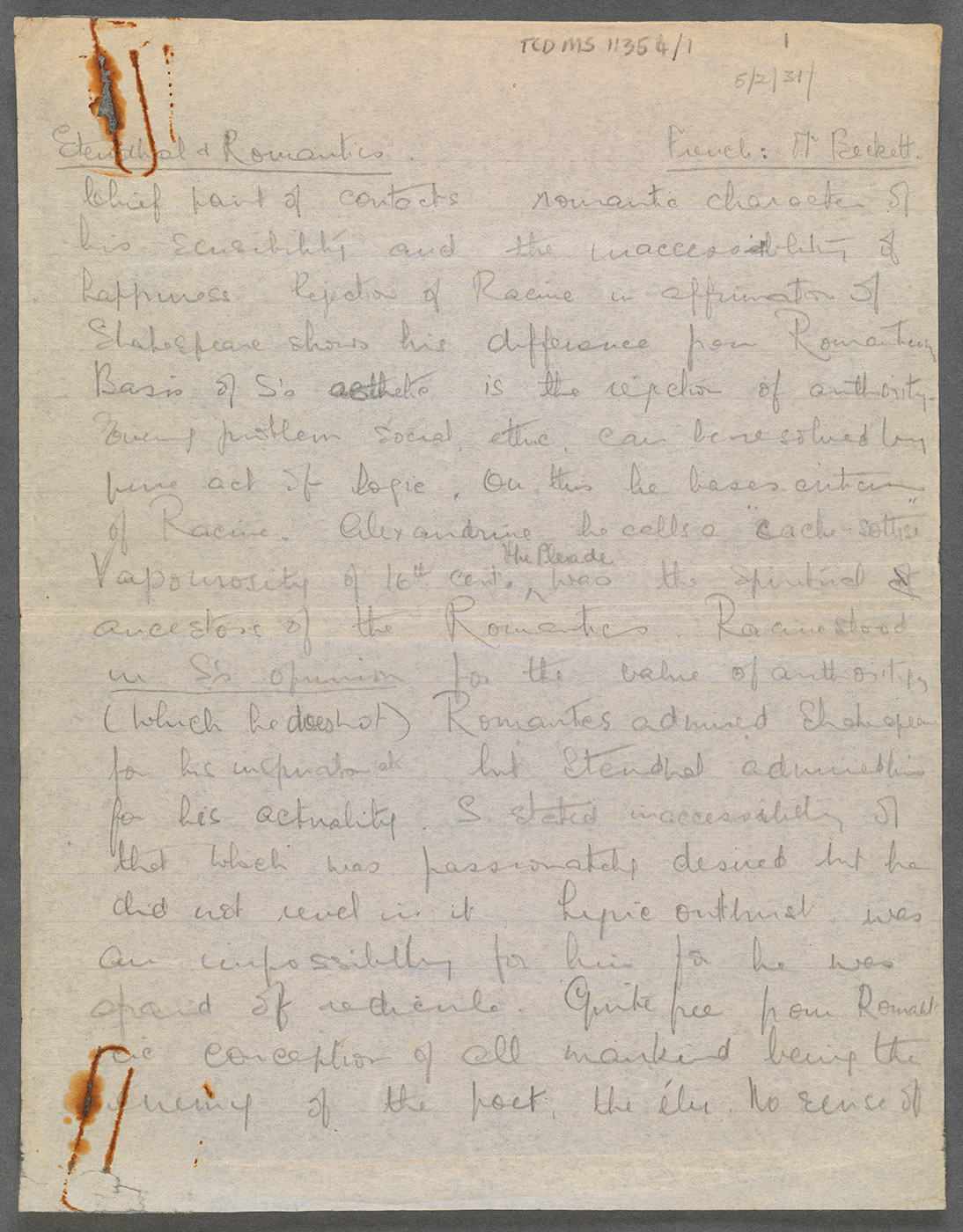 Aileen Conan’s notes taken in Samuel Beckett lectures (TCD MS 11354) by permission of the Board of Trinity College Dublin
Aileen Conan’s notes taken in Samuel Beckett lectures (TCD MS 11354) by permission of the Board of Trinity College Dublin
Aileen Conan, an undergraduate student, took these notes on a lecture ‘Stendhal & Romantics’ given by ‘Mr Beckett’ on 5/2/31. She graduated from TCD later that year.
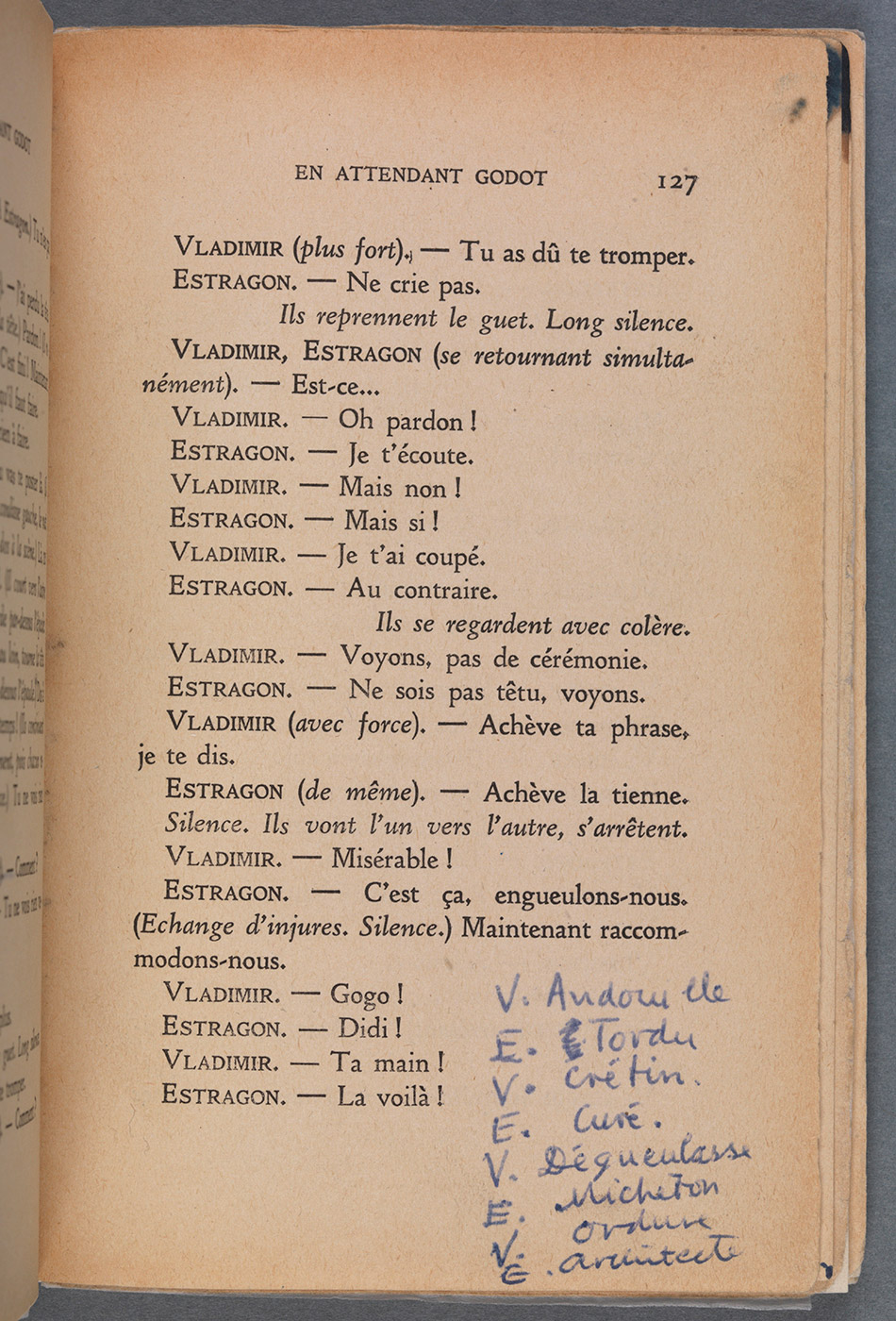 En attendant Godot pièce en deux acte (Les Éditions de Minuet, 1952). Annotated first edition (TCD MS 10495) by permission of the Board of Trinity College Dublin and the Beckett estate
En attendant Godot pièce en deux acte (Les Éditions de Minuet, 1952). Annotated first edition (TCD MS 10495) by permission of the Board of Trinity College Dublin and the Beckett estate
This copy of En attendant Godot was used by Samuel Beckett as a working rehearsal copy for the first performances of the work, and contains deletions and manuscript additions as Beckett revised the text in the course of rehearsals at the Théâtre de Babylone, Paris in January 1953. The image reproduced shows the introduction by Beckett of the celebrated exchange of insults between Vladimir and Estagon, ending with the height of abuse: ‘architecte’, an insult which Roger Blin, the play’s first director, apparently overheard in a Brussels taxi (note based on entry in the Manuscripts and Archives Online catalogue, TCD)
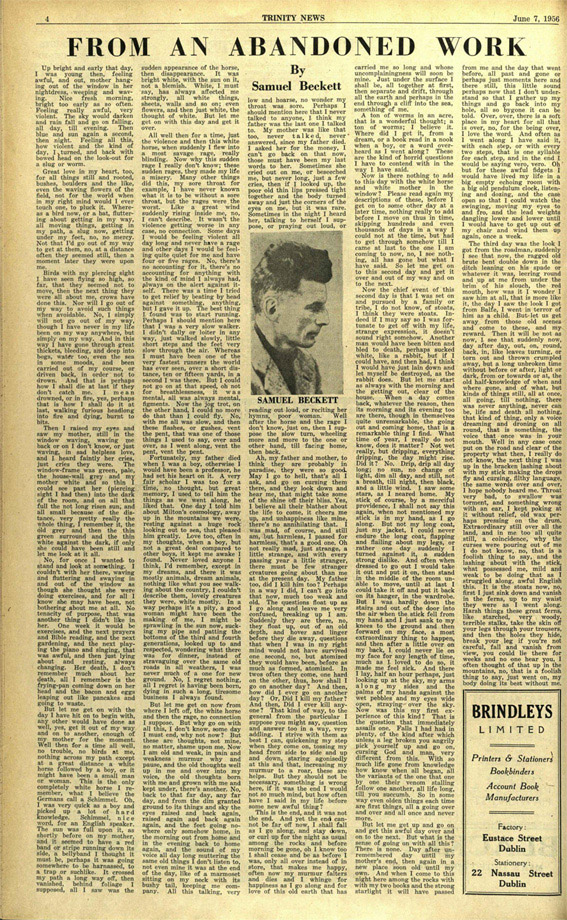 Samuel Beckett, ‘From an Abandoned Work’, Trinity News, June 7 1956.
Samuel Beckett, ‘From an Abandoned Work’, Trinity News, June 7 1956.
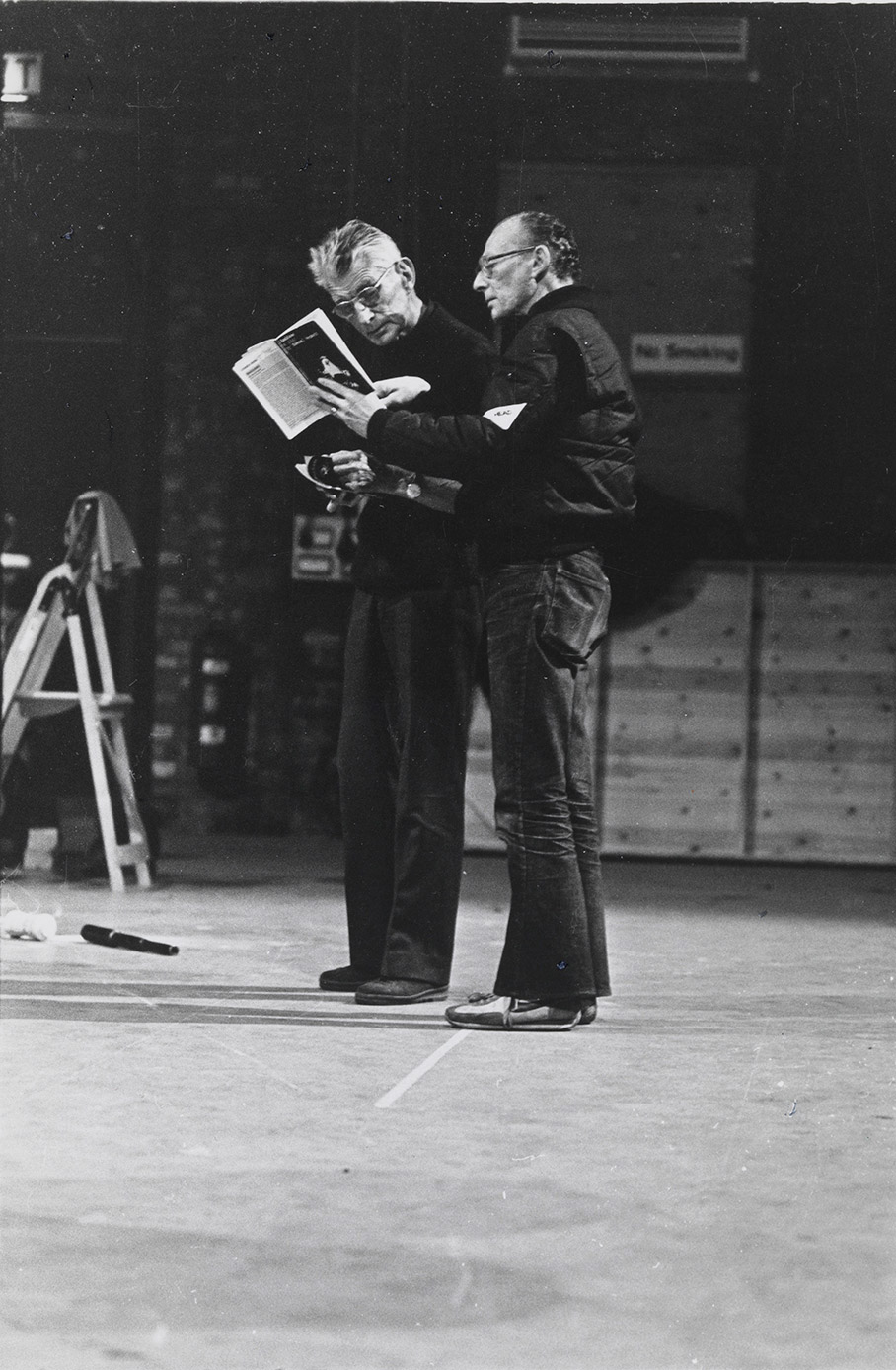 Photograph of Samuel Beckett by Charles Harris (from TCD MS 11409) by permission of the Board of Trinity College Dublin, The University of Dublin
Photograph of Samuel Beckett by Charles Harris (from TCD MS 11409) by permission of the Board of Trinity College Dublin, The University of Dublin
Samuel Beckett rehearses Endgame at Riverside Studios London May 1980.
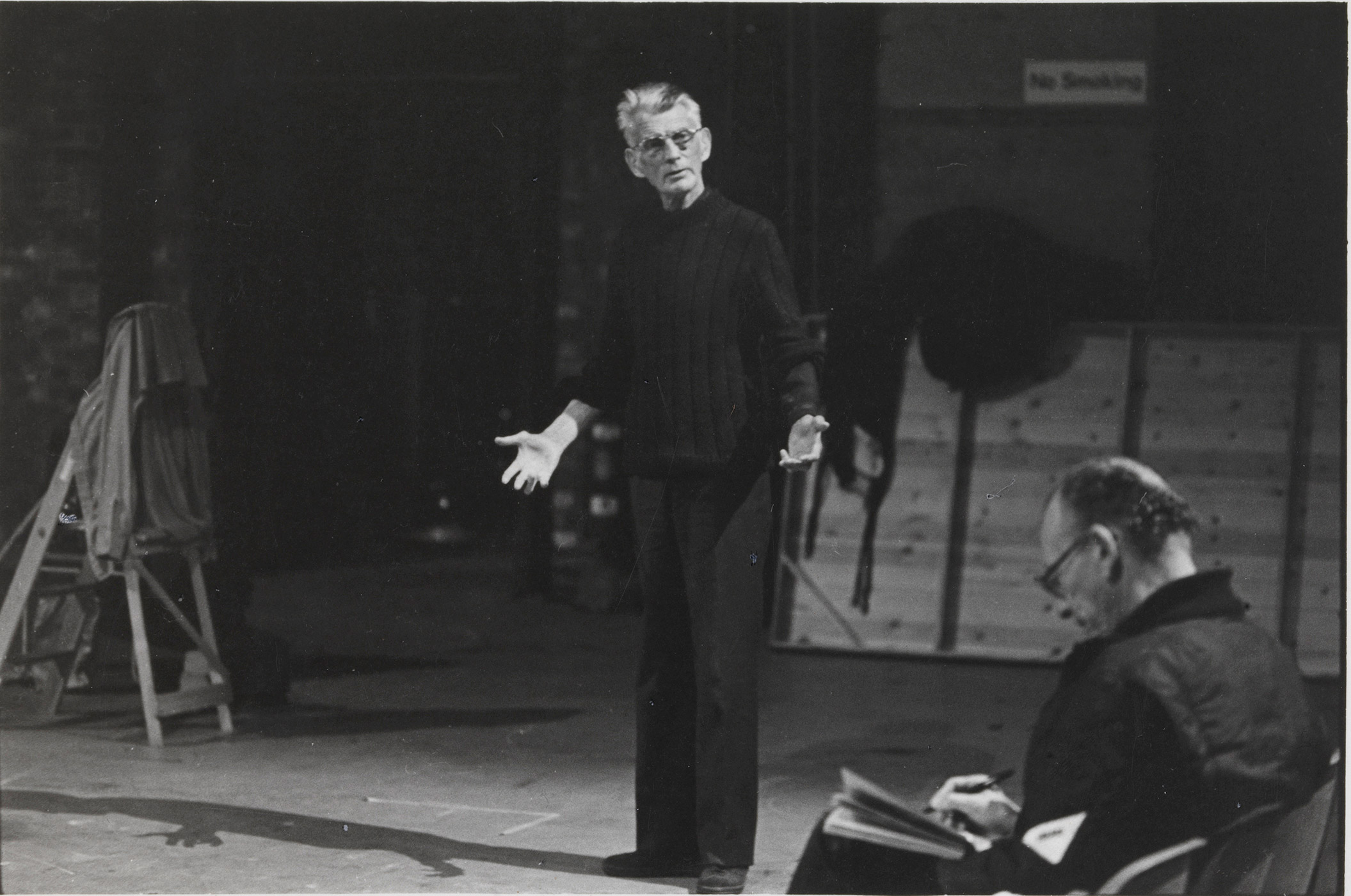 Photograph of Samuel Beckett by Charles Harris by permission of the Board of Trinity College Dublin
Photograph of Samuel Beckett by Charles Harris by permission of the Board of Trinity College Dublin
Samuel Beckett rehearses Endgame at Riverside Studios London May 1980.

